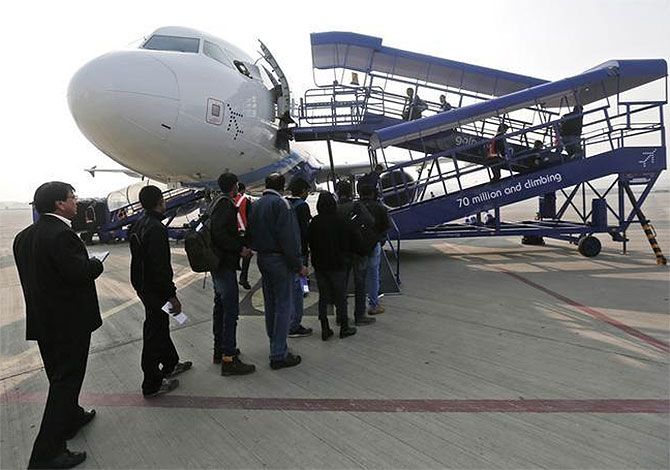Whatever the final outcome of this unhappy episode, one thing is clear: a glass once cracked cannot be fixed.
The trust is gone forever and the relationship between two old friends lies in tatters.
For now, IndiGo, the airline, will have to learn to soar with two angry and distracted commanders, says Anjuli Bhargava.
Part 1: Battle for IndiGo - The story so far

The two men met in the late 80s when Rahul Bhatia was a general sales agent for an American airline in India and Rakesh Gangwal worked at the same airline in the US.
By the late 1990s, the two had struck up a friendship that eventually became a deep bond.
So when Bhatia wanted to set up IndiGo Airlines, it was only natural that he would ask his friend Gangwal, who had built up a formidable reputation in the American aviation industry, to join him.
The company was set up in 2004 and a shareholder’s agreement was entered into by the partners, one wherein Gangwal relinquished most of the control to Bhatia since the latter felt that his US-based partner was far from the scene of action and unfamiliar with India and its ways.
The shareholder’s agreement and articles of association of the company that were drawn up were, in fact, unusually tilted in Bhatia’s favour.
Not only does the agreement give Bhatia three board seats as opposed to Gangwal’s one, it also gives him the right to nominate directors and senior management appointees and obliges Gangwal to go along with his choices.
In fact, Gangwal wasn't even on the company’s board until IndiGo went in for an IPO in 2015.
Growing mistrust
As IndiGo grew by leaps and bounds, the co-founders of the airline seemed to be getting along just fine.
But then, about four years ago, the seeds of mistrust were sown in Gangwal’s mind.
He was getting increasingly uncomfortable with the related party transactions (RPTs) that the airline had entered into with Bhatia’s parent company, InterGlobe Enterprises (IGE).
It was a concern he’d raised from time to time with Bhatia and other senior members of the management.
But he was always fobbed off with responses such as “they would look into it”.
At times, he was told that it was something that Bhatia himself was unaware of.
Gangwal always ended up giving his partner the benefit of doubt.
But sources say that his antenna was up.
What started as a small niggling issue began to bother him more and more.
The break point came in 2018 when a simulator contract that had been entered into got automatically extended for 15 years when he had been told all along that it would not be extended.
What’s more, it was done without the knowledge of the audit committee.
That’s when Gangwal snapped and what followed was the email in August last year announcing his withdrawal from the day-to-day operations of the airline.
The RPT issue was important to Gangwal even when the company was being set up.
His lawyers had told him that the shareholder’s agreement that gave Bhatia almost all control was absurd, and had also warned him that Indian promoters had a predilection for entering into RPTs that enriched their other companies.
As a result, Gangwal had two clauses inserted into the company's code of conduct.
One, the company would not enter into RPTs unless unavoidable, and two, all RPTs would be entered into with complete disclosure to the full board.
Sources close to Gangwal say the RPT issue is not one about money. He found the process followed for signing RPTs was in violation of the code of conduct of the company.
In the past, IndiGo has entered into RPTs without signing, and backdated, cancelled or not renewed them on a whim, and also entered or exited them without disclosure to the audit committee.
Often, the board, too, was unaware of the RPTs.
Other than RPTs, Gangwal has also raised questions about Bhatia staying away from a board meeting to prevent a quorum, executing a last minute surprise with a legal opinion and blocking a requisitioned shareholder meeting.
The May 28 meeting
While the relationship between the two partners had deteriorated since August 2018, one last attempt at reconciliation was made at a meeting held in the offices of Bhatia’s lawyer on May 28 this year.
It was at this meeting that Gangwal suggested expanding the IndiGo board to eight members, adding one independent woman director and taking Bhatia’s representation on it from the present 50 per cent to 57 per cent while he would continue to have only one nominee director.
But he added two conditions: First, that new protocols with regard to RPTs would be put in place, and second, he should be freed from his obligation to vote for the nominees put forward by Bhatia in the future.
According to sources close to Gangwal, the proposal was “great for the company”, “good for Rahul” and “bad for Rakesh” from a control point of view.
Even so, the contract and its language was rejected by Bhatia.
The “package” was described as outrageous and one that revealed Gangwal’s so-called “hidden agenda”.
That was the last meeting between the feuding partners.
Next thing, Gangwal had escalated the matter to SEBI, grabbing national attention and battering the company's stock.
It’s all about control
The Bhatia camp insists that the very fact that Gangwal was linking his desire to bring in more transparency into RPTs with dropping the clause that binds him to vote in favour of Bhatia’s nominees reveals that his primary agenda was to take back some of the control that he had willingly relinquished years ago.
Why should Bhatia have agreed to this just because it suited his partner now, argue his supporters.
They say that the outrage over the RPTs is really a “red herring” to conceal Gangwal’s true agenda.
According to sources close to Bhatia, RPTs have been around from the beginning and they were entered into only when they were in the best interest of the airline.
While there may have been procedural glitches when contracts were drawn up, there was never any malicious intent or wrongdoing at any stage, they say.
In fact, IGE entered into contracts in a supportive role. For instance, rental contracts for IndiGo’s office space have been entered into without advances and deposits, something few landlords would agree to.
Nonetheless, since the matter was irking his partner so much, Bhatia and the board members were already looking closely into the RPTs and would have brought in the transparency that Gangwal claims was missing.
But after the latter’s ulterior motive came out into the open on May 28, Bhatia sees no reason to play ball, say his supporters.
As far as he’s concerned, his partner is welcome to parade himself as a “crusader for governance”, but in the end, truth will prevail.
According to Bhatia and Co, the shareholder’s agreement is skewed in Bhatia’s favour because while Gangwal limited his financial risk in the airline, at its peak, Bhatia’s exposure was 80 times that of his partner.
Sources add that in 2008, when the company went through a turbulent phase, it was Bhatia who brought in money through IGE to tide over the crisis while Gangwal watched from afar.
They say, moreover, that till July 2018, Bhatia’s disproportionate control didn’t seem to bother Gangwal and neither him, nor Anupam Khanna, his board nominee on the audit committee, ever raised any objection to any RPTs in 14 years of operation.
Sources in the Bhatia camp allege that Gangwal is also irked by the fact that that the stakes have completely changed from the time the two set up the company in 2004-05.
Today, IndiGo is a highly successful airline with a peak market capitalisation of Rs 66,000 crore.
Due to the control premium he enjoys, Bhatia’s stake of 38 per cent of the airline is far more valuable than Gangwal’s 37 per cent.
And so what Gangwal is really after now is an equal say in who holds the reins and steers the company.
The riddle of unequal control
So how did the two partners, who are almost equal owners of stake, arrive at an agreement that gives so much control to one of them?
Gangwal says that in 2004-05, each of them put in an equal amount of equity when the airline was formed - a point Bhatia refutes.
However, Gangwal is unable to fully explain why he relinquished so much control to his partner if his contribution to the kitty was equal.
“Blind trust” sounds like an implausible reason to anyone who knows Gangwal, who is respected both for his domain knowledge and his canny, sharp business instincts.
Bhatia claims to have “generously allotted 50 per cent of equity” to Gangwal, even though he says his partner put up the bare minimum equity at the time the company was set up.
Yet he fails to explain why he handed out an equal stake to someone who was contributing far less than him.
While almost everyone acknowledges that Bhatia could probably not have built IndiGo into what it is today without Gangwal, who is competent and respected in the global industry, would a businessman as astute as Bhatia give up half the stake and yet bear almost the full risk?
IndiGo senior management sources say that the fact that Bhatia had started asserting himself and sidelining his partner irked Gangwal.
Hence, he made a mountain out of a molehill and made RPTs the excuse to launch his attack on Bhatia.
What observers find hard to swallow is that a man like Bhatia, who is certainly in no need of cash, would want to make a quick buck from RPTs, especially since the total value of the RPTs entered into is less than one per cent of the consolidated turnover of the company.
Many feel the suggestion that Bhatia would indulge in what can only be called petty thievery is laughable.
The Gangwal camp rubbishes the narrative that he is “fighting for more control”.
They argue that control has been and remains immaterial to Gangwal.
He was quite content to strategise and guide from afar, as long as his trust was intact.
Gangwal, they point out, raised the issue of governance and RPTs and withdrew himself from the day-to-day running of the airline in August 2018, which was well before the hiring of Ronojoy Datta as CEO and the brokering of the engine deal - moves that were executed without his approval.
According to Gangwal’s supporters, the RPT issue has been linked to his being obliged to vote for Bhatia’s nominees because without that and with board control and one pliable board nominee, the IGE group would be “back at the same game”.
The very fact that he has proposed an expanded board that takes Bhatia’s representation up from the current 50 per cent to 57 per cent while he retains only one nominee director is evidence that he is not after control.
There are numerous points of dissension between the duo that go beyond the scope of this article.
Whatever the final outcome of this unhappy episode, one thing is clear: a glass once cracked cannot be fixed.
The trust is gone forever and the relationship between two old friends lies in tatters.
For now, IndiGo, the airline, will have to learn to soar with two angry and distracted commanders.
Photograph: Adnan Abidi/Reuters











